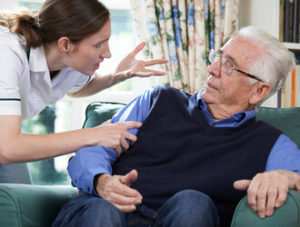
When your family places a beloved relative in a nursing home, you have a right to expect that your loved one will be provided quality care and treated with respect. When a nursing home fails to uphold that trust and an elderly resident suffers neglect or is subjected to physical or emotional abuse, your family member needs an advocate. You should speak with a knowledgeable nursing home abuse lawyer about your legal rights.
Some health care providers become desensitized to the physical limitations and needs of nursing home residents. The caregivers start to disregard the needs of residents or take out their job frustrations on the residents, neither of which should ever happen, but unfortunately do. A nursing home neglect lawyer at Sansone & Lauber may be able to focus attention on nursing home practices that cause harm to patients. If you file a lawsuit, it may protect your loved one from further injury and also prevent other long term care residents from suffering similar harm.
Our Nursing Home Abuse Lawyer Can Help Today
Nursing home abuse includes physical abuse such as slapping or hitting a resident, improper physical or chemical restraint of a resident, as well as sexual abuse such as unwanted touching, indecent exposure, or any non-consensual sexual contact. Factors that constitute neglect include the failure to provide food, medicine, proper positioning, or clean bedding. Residents are often ashamed or afraid of what is occurring and may suffer in silence.
Look for the Signs of Nursing Home Abuse
Nursing home residents who are physically or mentally ill or frail from age are vulnerable to neglect or abuse by those who they depend upon for their daily care. If you regularly visit a nursing home resident, you should be aware of the warning signs of nursing home neglect.
Anyone who suspects a nursing home resident or any elderly person is being abused, neglected, or exploited can make a report in Missouri to the state’s Adult Abuse and Neglect Hotline at 1-800-392-0210. In Illinois, the number is 1-800-252-4343. Certain professionals are required by law to report abuse and/or neglect, but is often a family member who alerts authorities to the fact that a nursing home resident is being harmed.
You can get faster action in most cases, including work to protect your legal rights, by contacting an experienced nursing home abuse and neglect attorney. The injury attorneys of Sansone & Lauber can help you or your loved one obtain medical care while working to end the abuse or neglect, and seeking compensation for injuries and other losses. Contact us today.
Nursing Home Mistreatment in Missouri
Missouri law recognizes three types of illegal mistreatment of the elderly (other federal and state laws and advocacy organizations have similar definitions):
- Abuse – The infliction of physical, sexual, or emotional injury or harm.
- Neglect – The failure to provide needed services by any person, firm, or corporation with a legal or contractual duty to do so, when such failure presents either an imminent danger to the health, safety, or welfare of the client or a substantial probability that death or serious physical harm would result.
- Financial Exploitation – Using deception, intimidation, or force to obtain control over the elderly person’s property with the intent to permanently and detrimentally deprive them of the use, benefit, or possession of his or her property.
Nursing Home Abuse Warning Signs
Warning signs that a nursing home resident may be a victim of neglect or abuse include:
- Withdrawal — The resident suddenly becoming uncommunicative, nonresponsive, or less alert than usual; unexplained or uncharacteristic withdrawal from activities; withdrawal from or anxiety in the presence of certain staff members or other residents.
- Physical Injury — Unexplained or inadequately explained cuts, punctures, bruises, burns, welts, sprains, dislocations, or fractures, including signs of being restrained by ropes or belts. Head injuries or traumatic brain injury (TBI) may indicate a fall, which is often caused by neglecting a nursing home resident’s need of assistance.
- Sexual Abuse — Injuries including bruises around the genitals, anal bleeding, vaginal bleeding, and genital infections or venereal disease. Sexual abuse includes unwanted touching, all types of sexual assault or battery, including rape, sodomy, coerced nudity, and sexually explicit photographing. A sexual abuse victim is also likely to withdraw from interpersonal interaction or activities.
- Physical Neglect — Dehydration, malnutrition, and/or unattended or untreated illness or other health problems, including infections and/or pressure sores (bedsores); poor personal hygiene; soiled or inadequate bedding or clothing; fecal / urine smells.
- Financial Loss — Unexplained disappearance of money, stock, or possessions; unexplainable or abrupt changes in a will or other financial documents; forged signatures on financial documents; provision of unnecessary services or lack of services that are being paid for.



 Site by Consultwebs.com: Law Firm Website Designers/Personal Injury Lawyer Marketing.
Site by Consultwebs.com: Law Firm Website Designers/Personal Injury Lawyer Marketing.